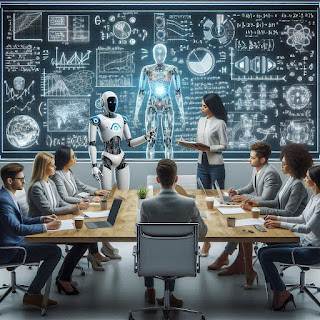I. Introduction
- Definition of AI
- Overview of the changing job landscape
II. The Impact of AI on Jobs
- Job displacement vs. job enhancement
- Industries most affected by automation
III. Embracing Automation
- Upskilling and reskilling
- Collaborating with AI technologies
IV. AI in the Workplace
- Examples of AI integration
- Benefits of AI in improving efficiency and productivity
V. Overcoming Challenges
- Addressing fears of job loss
- Ensuring equitable access to AI opportunities
VI. The Future of Work
- Evolution of job roles
- Potential societal implications
VII. Conclusion
- Summary of key points
- Encouragement for embracing AI in the workplace
AI and the Future of Work: Embracing Automation in a Changing Job Landscape
In recent years, the advancement of artificial intelligence (AI) has significantly impacted various aspects of our lives, including the way we work. As AI continues to evolve, it is reshaping the job landscape, presenting both challenges and opportunities for workers across industries.
Introduction
Artificial intelligence, often referred to as AI, encompasses technologies that enable machines to perform tasks that typically require human intelligence. From machine learning algorithms to natural language processing, AI systems are becoming increasingly sophisticated, capable of analyzing vast amounts of data and making complex decisions.
Simultaneously, the job landscape is undergoing a transformation, driven by automation and digitalization. Traditional roles are evolving, while new job opportunities are emerging in sectors previously untouched by technology. Understanding the impact of AI on the future of work is crucial for individuals and organizations navigating these changes.
The Impact of AI on Jobs
The integration of AI into various industries has raised concerns about job displacement. However, it's essential to recognize that AI also presents opportunities for job enhancement. While some repetitive tasks may be automated, AI technologies can augment human capabilities, leading to more fulfilling and creative roles.
Industries such as manufacturing, transportation, and retail are experiencing significant changes due to automation. Jobs that involve routine tasks are at higher risk of being replaced by AI-driven systems. However, professions requiring human empathy, critical thinking, and creativity are less susceptible to automation.
Embracing Automation
To adapt to the changing job landscape, individuals and organizations must embrace automation proactively. Upskilling and reskilling initiatives are essential to equip workers with the necessary competencies for jobs of the future. Continuous learning and development enable individuals to stay relevant in a rapidly evolving economy.
Collaborating with AI technologies can also enhance productivity and efficiency in the workplace. By leveraging AI-powered tools for data analysis, decision-making, and customer service, organizations can streamline operations and deliver better outcomes.
AI in the Workplace
The integration of AI into the workplace is already underway across various sectors. In healthcare, AI systems assist physicians in diagnosing diseases and recommending treatment plans. In finance, AI algorithms analyze market trends and optimize investment strategies. These examples demonstrate how AI can complement human expertise, leading to more accurate and timely outcomes.
The benefits of AI in the workplace extend beyond efficiency gains. By automating routine tasks, employees can focus on higher-value activities that require creativity and problem-solving skills. AI-driven insights also enable organizations to make data-driven decisions, leading to better outcomes and competitive advantages.
Overcoming Challenges
Despite the potential benefits of AI, there are concerns about job loss and inequality. Addressing these challenges requires proactive measures to ensure that the benefits of AI are accessible to all. Investing in education and training programs can help mitigate the impact of job displacement by preparing workers for emerging roles in the digital economy.
Additionally, efforts to promote diversity and inclusion in AI development are essential to avoid perpetuating biases and inequalities. By prioritizing ethical considerations and ensuring transparency in AI algorithms, we can build trust in these technologies and maximize their potential for positive impact.
The Future of Work
As AI continues to evolve, the nature of work will continue to evolve alongside it. While some jobs may become obsolete, new opportunities will emerge, requiring a blend of technical and soft skills. The future of work is likely to be characterized by flexibility, adaptability, and lifelong learning.
Societal implications of AI adoption must also be considered, including potential shifts in income distribution and power dynamics. By actively shaping the future of work, we can create a more inclusive and equitable society where the benefits of AI are shared by all.
Conclusion
The rise of artificial intelligence is transforming the way we work, presenting both challenges and opportunities for individuals and organizations. By embracing automation and investing in skills development, we can harness the full potential of AI to create a future where work is more meaningful, productive, and inclusive.
FAQs
1.Will AI replace all jobs?
While AI may automate certain tasks, many jobs require human creativity, empathy, and critical thinking, making them less susceptible to automation.
2. How can individuals prepare for the future of work?
Continuous learning and upskilling are essential to stay competitive in a rapidly evolving job market. Embracing technological advancements and developing transferable skills can help individuals adapt to changing job roles.
3. What industries are most affected by AI automation?
Industries such as manufacturing, transportation, and retail are experiencing significant changes due to automation. However, AI is also making inroads into healthcare, finance, and customer service sectors.
4. What are the ethical implications of AI in the workplace?
Ethical considerations, such as bias in AI algorithms and job displacement, must be addressed to ensure that the benefits of AI are accessible to all. Transparency, accountability, and diversity in AI development are essential to building trust in these technologies.
5. How can organizations leverage AI to improve productivity?
By integrating AI-powered tools for data analysis, decision-making, and automation, organizations can streamline operations, reduce costs, and deliver better outcomes for their customers and stakeholders.






.jpeg)


Comments
Post a Comment